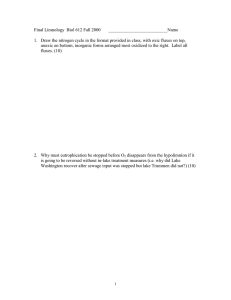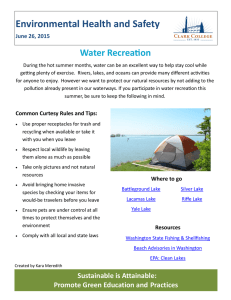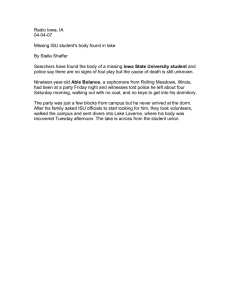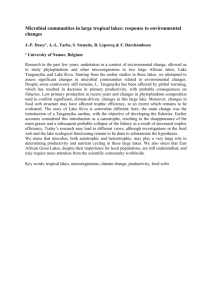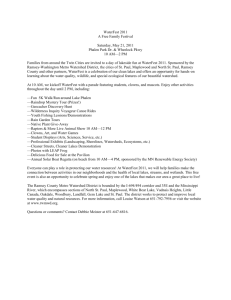Recreation Demand Using Physical Measures of Water Quality
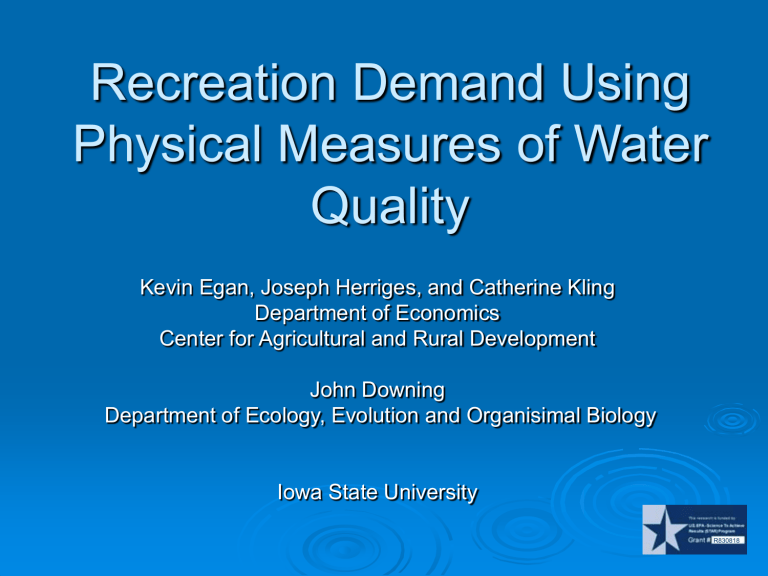
Recreation Demand Using
Physical Measures of Water
Quality
Kevin Egan, Joseph Herriges, and Catherine Kling
Department of Economics
Center for Agricultural and Rural Development
John Downing
Department of Ecology, Evolution and Organisimal Biology
Iowa State University
R830818
Linking Recreational Values to
Physical Water Quality
Regulatory considerations, such as TMDL standards, require developing physical water quality standards.
Yet the linkage between the physical measures of water quality and the values associated with water resources is poorly understood.
Recreation demand models have found water quality matters, but have typically had to rely on limited measures, such as
Catch rates (e.g., Chen, Lupi, and Hoehn, 1999),
Toxin levels (Phaneuf, Kling and Herriges, 2000), or
Water quality indicators (Parsons, Helm, and Bondelid, 2003)
Understanding the linkage between physical attributes and water quality values is important to
setting water quality standards prioritizing restoration efforts
Iowa Lakes Valuation Project
Collaborative project involving economists and ecologists studying Iowa lakes
Builds off of existing 5 year study of the ecological conditions of 132 lakes in Iowa (2000-2004)
EPA Star grant augments work begun with Iowa DNR funding and CARD support – 4 year project
A four-year panel data set of survey responses will be collected involving
Actual trip behavior and future expected trips, years 2001-2006
2 nd through 4 th year survey will contain water quality scenarios measuring WTP for quality improvements
Knowledge and perceptions regarding lake quality
Baseline Survey
First of four mail surveys
8000 Iowa residents selected at random
Survey collected
trip data for 132 lakes
• 2001 and 2002 actual trips
• 2003 anticipated trips attitudes regarding lake quality
Socio-demographic data
62.1% response rate
Figure 2: Average number of day trips
9
8
7
6
3
2
5
4
1
0
2001 2002 2003
Iowa Lake s Mississippi/Missouri Rive r Lake s outside of Iowa
62.8% of Iowa households took at least one trip
Summary Statistics
Table 2. Lake Characteristics Summary Statistics
Variable Mean Std. Dev.
Minimum Maximum
Day Trips per
Individual
Price
6.68
135.79
10.46
29.47
0
94.12
52
239.30
Acres 672.20
2,120.30
10 19,000
Log(Acres)
Ramp
Wake
Handicap
Facilities
State Park
4.81
0.86
0.66
0.39
0.39
1.69
0.35
0.47
0.49
0.49
2.30
0
0
0
0
9.85
1
1
1
1
Summary Statistics
Table 3. Physical Water Quality Summary Statistics
Variable Mean Std. Dev.
Minimum Maximum
Secchi Depth (m)
Chlorophyll (ug/l)
1.17
40.93
0.92
38.02
0.09
2.45
5.67
182.92
NH
3
+NH
NO
3
4
(ug/l)
+NO
2
(mg/l)
Total Nitrogen (mg/l)
Silicon (mg/l) pH
Alkalinity (mg/l)
Inorganic SS (mg/l)
Volatile SS (mg/l)
292.15
1.20
2.20
Total Phosphorus (ug/l) 105.65
4.56
8.50
141.80
9.43
9.35
158.57
2.54
2.52
80.61
3.24
0.33
40.98
17.87
7.93
72
0.07
0.55
17.10
0.95
7.76
73.83
0.57
1.64
955.34
14.13
13.37
452.55
16.31
10.03
286.17
177.60
49.87
Modeling Issues
Randomly divided sample into three segments:
Specification
Estimation
Prediction
Modeling approach: repeated mixed logit
Specification considerations
Inclusion/exclusion of specific water quality measures
functional form (e.g., linear, quadratic or logarithmic) random versus fixed parameters
Repeated Mixed Logit
U ijt
( ;
ij i
)
ijt
, i
1,...,1286; j
0,...,129; t
1,...,52.
Conditional on the parameter vector,
i
, the probability of observing that
Individual i chooses alternative j on choice occasion t follows the standard logit form:
L ijt
ijt k
J
0
xp V ikt
P
assuming i.i.d.
so that
P ijt
L ijt
Specification
U ijt
z'
z i p
P ij
q '
Q j
i a '
A j
ijt
, j
J where z i
is the vector of socio-demographic data,
P ij
represents the computed travel cost or "price" of the recreation trip
calculated as: P ij
=.25*distance+
1
3
Q j
represents the p hysical water quality measures for each lake,
A j
represents the attributes for ea ch lake .
Variable
Income
Male
Age
Age 2
School
Household
Price
Log(Acres)
Ramp
State Park
Facilities
Wake
Coefficient Results
Using 6 physical
WQ measures
Variable
Mean Dispersion
Secchi Depth
-0.06
Chlorophyll
-5.79
Total Nitrogen
-0.35
Total Phosphorus
-0.0004
Inorganic SS
-2.61
Volatile SS
-2.50
-0.48
4.38
11.14
3.83
0.80
2.43
-12.24
3.75
18.86
14.86
14.40
10.48
2.44
Using 6 Physical
WQ measures
0.87
0.61
-0.15
-2.51
-0.73
-0.20
Comparing Water Quality across Lakes
Secchi
Depth (m)
Chlorophyll
Total
Nitrogen
Total
Phosphorus
Inorganic
Suspended
Solids
Volatile
Suspended
Solids
West
Okoboji
Lake
Averages of the nine focus lakes
5.67
1.23
2.63
0.86
21.28
1.00
1.79
40.13
3.64
91.11
9.52
8.42
Medians of the non-impaired lakes
Averages of the
65 impaired lakes
0.90
0.70
6.55
1.10
56.76
2.77
43.87
153.70
5.42
20.42
3.62
15.49
Silver Lake
West Okoboji Lake
Willingness to Pay Estimates
Average Annual WTP
Nine focus lakes improved to
Sixty-five impaired lakes improved to the median of the non-
West Okboboji impaired lakes
Per Iowa household $11.86
$10.23
$13,675,685 $11,799,261 for all Iowa households
Predicted Trips
(8.0 currently)
8.3
8.2
Willingness to Pay Estimates
Lake
Coralville Lake
Saylorville Lake
Red Rock Lake
Storm Lake
Trumbull Lake
Lake Darling
Black Hawk Lake
Badger Creek Lake
Rathbun Lake
Hannen Lake
Lakes with the Highest Valued Improvements
On EPA’s
Impaired
Waters
List
Annual
WTP
Secchi
Depth
(m)
Total
Phosphorus
(ug.l)
Total Annual
2002 Day Trips
Yes $10,600,000 0.8 204 457,000
No
No
$6,000,000
$3,700,000
0.7
1.5
101
99
600,000
284,000
Yes 0.5
89 232,000
Yes
Yes
Yes
Yes
No
No
$1,100,000
$900,000
$800,000
$800,000
$800,000
$600,000
$500,000
0.1
0.3
0.9
0.6
0.9
1.3
453
226
193
290
44
227
20,000
63,000
99,000
63,000
248,000
41,000
Average
Travel Cost
$106
$97
$112
$157
$168
$124
$138
$104
$139
$101
Average across all lakes
$300,000 1.2
106 83,000 $136
4
7
5
Figure 8: Lake zones
8
2
3
9
10
1
6
Conclusions
Recreator’s trip behavior is responsive to physical measures of Water Quality
Better water clarity increases recreational trips
Nutrients decrease recreational trips
Allows consumer surplus measures to directly be linked to physical water quality improvements
Iowans value more highly a few lakes with superior water quality over all recreational lakes at an adequate level
Findings allow prioritization for clean-up activities to generate the greatest recreation benefits for a given expenditure
Rank which lakes and in what order and most efficient levels of improvement
Next Stages of Project
2003 Survey gathered
A second year of trip data
Perceptions data regarding water quality
Stated preference data regarding water quality improvements
2004 Survey is currently in development
Water Quality Perceptions
Full Sample
Corr.
p-value
Water Contact
Corr.
p-value
Non Water Contact
Corr.
p-value
Day Trip Per
Capita
Secchi Depth
Chlorophyll
NH3+NH4
NO3NO2
Total Nitrogen
Total
Phosphorus
Silicon pH
Alkalinity
ISS
VSS
-0.33
-0.40
-0.09
-0.20
-0.33
-0.38
0.25
0.42
-0.30
-0.24
-0.04
-0.19
0.00
0.00
0.29
0.02
0.00
0.00
0.00
0.00
0.00
0.01
0.67
0.03
-0.32
-0.39
-0.10
-0.21
-0.34
-0.38
0.26
0.43
-0.29
-0.23
-0.03
-0.18
0.00
0.00
0.23
0.02
0.00
0.00
0.00
0.00
0.00
0.01
0.75
0.04
-0.25
-0.27
0.03
-0.13
-0.10
-0.15
-0.10
0.13
-0.16
-0.11
-0.15
-0.20
0.00
0.00
0.75
0.13
0.26
0.10
0.24
0.13
0.08
0.20
0.09
0.02
